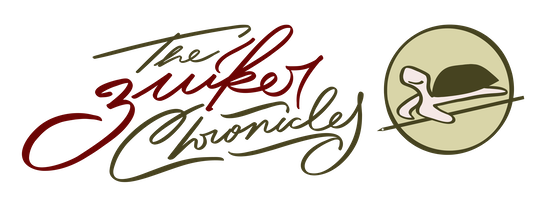Thinking of you, Vanuatu
by Anton Zuiker on March 17, 2015
This essay was originally published in 2015 on Yumi stap storian, a site I administered off and on for writing about Peace Corps Volunteers in Vanuatu.
Last week, Cyclone Pam aimed for the islands of the Republic of Vanuatu, an 82-island archipelago in the South Pacific where I served, along with my wife, Erin, as a Peace Corps Volunteer from 1997 to 1999.
We started to worry for our friends and family there. We’d seen our share of cyclones during our time there, but nothing as strong as this storm. Actually, many are saying this cyclone is the strongest ever seen in the South Pacific.
By Friday, Pam was the equivalent of a category-four hurricane, slowly churning its way down the island chain. It went over Paama, the lush, hilly 2-mile by 6-mile island where I had lived, and then the cyclone strengthened even more. When its eye went directly over the capital city, Port Vila, it was a ferocious category five, with winds gusting up to 185 mph and 9 inches of rain already washing out roads and bridges.
[image of cyclone on map]
Saturday: Pam was still tearing up the islands, and there was precious little news from Port Vila, and none from Paama and the other islands north, or Tanna and the islands south.
Sunday: Reports on Facebook and Twitter were confirming that nearly all the buildings in Vila had been damaged or destroyed. One short video from there showed people picking through their soaked belongings, and pigs rooting through the remains of the traditional bamboo-and-thatch huts and rusty shacks. A rooster sings out nearby.
Powerless to do anything about the storm, I went out walking near my home in North Carolina. The morning sky was clear and blue, the air warm and still, and the ground puddled and muddy from gentle rains last week. A few small snails were inching along the pavement, while crows above flew tree to tree answering each other, and through the woods came the sounds of woodpeckers knocking one after the other. Farther away, a rooster was proclaiming the morning.
When I lived on Paama, roosters would strut and crow through the day, and from my classroom at the elementary school where I taught, I could hear that sound echoing through the coconut palms and mango trees.
The rooster call was a defining sound of my South Pacific experience — cookarootoo, as the Ni-Vanuatu say. That was an amusing difference, since I’d grown up with the American way of mimicking a rooster: cock-a-doodle-do.
Another cultural difference: Ni-Vanuatu can communicate with their eyebrows, often to mean ‘yes’ but, along with a flutter of the hand, just as often to mean something more complex, such as ‘Can you help me plant my garden today?’
On Paama, most people live day to day by what they grow in their gardens on the steep hillsides. The rich volcanic soil grows some of the juiciest watermelon I’ve ever enjoyed, and the staple taro and yams that sustain the villagers. In 2013, heavy rains over Paama caused landslides that destroyed many gardens, and the people relied on emergency food aid from Australia and New Zealand.
There’s no word yet from Paama about what Pam’s winds and rains did to the villages of Liro, Lironessa, Asuas, Voravor, and Tavie, the five villages I served. But flyover assessments today are confirming that many gardens are destroyed on the islands near Paama. Many countries have already begun to send food and water and relief supplies. I hope some of that gets to my friends on Paama.
We’d like to do our part and send a box of seed packets and new clothes, and more. We will, just as soon as it’s clear the grass airstrip is ready to receive the Twin Otter airplane, or we hear that the few cargo ships survived the cyclone and can once again make their island to island runs.
Will there be roosters to welcome them? I don’t know. But in my mind I can already hear the sound that will echo through the trees when the first ship is sighted, the hwooo-wheehee called out and repeated person to person through the valley and up the hillsides. What relief the villagers will feel when they first hear and repeat that call! They will hurry down to the black-sand beach to unload the bags of rice and flour and cement, and maybe medicine and mail from faraway friends.
During my time on Paama, I, too, ran down to the beach to join the line of men carrying the normal deliveries up to dry land. As a Peace Corps Volunteer, I was there to assist them, through education, and a water project, and solar lighting for their homes. Whatever I may have accomplished then might be gone now, from time or cyclone’s winds. I wish that I could rush back to Paama to help them regroup and rebuild.
My Peace Corps service in Vanuatu lasted two challenging but quite rewarding years, years that most certainly strengthened me. My Ni-Vanuatu hosts and friends and partners were joyous, and generous, and patient and kind. The lessons they taught me — about working side by side and for the community — have inspired my life and work here in North Carolina.
Today, I’m anxiously waiting on word from Paama. But my eyebrows are up, saying yes, I will find a way to help you in your garden.
Next post: Get out
Previous post: Zuiker PhotosGo to HOME

